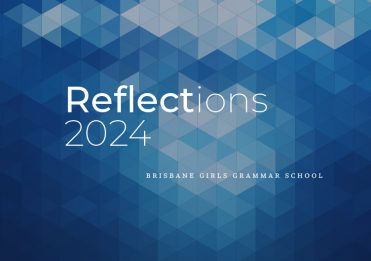The Object of Substance investigated here is the archived collection of minutes of the meetings of Brisbane Girls Grammar School’s Board of Trustees. To some readers, this may sound a dry (even boring) choice, but these records provide vivid insights into the economic and social fabric of the times that influenced decision-making.
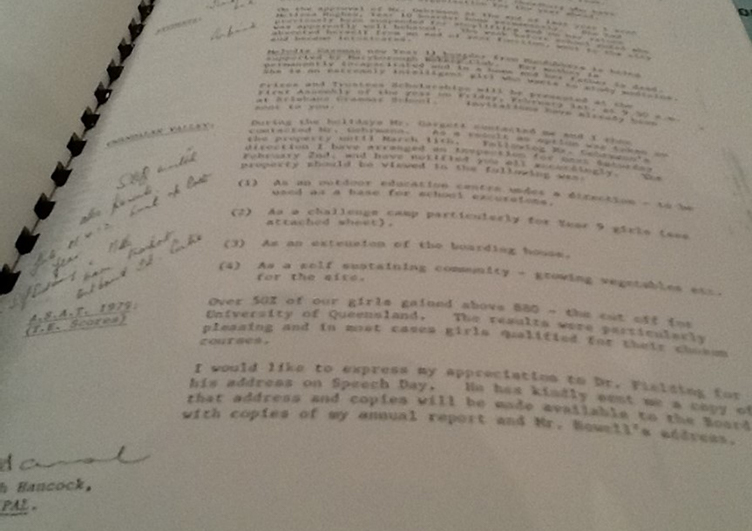
1979 Minutes (detail)
In an academic school, like Brisbane Girls Grammar School, which promotes a ‘liberal education’, some might challenge that the inclusion of a subject like Accounting does not fit neatly within the liberal arts. Others would argue that the subject is ‘vocational’ and, therefore, not worthy of inclusion in the curriculum of a highly academic school. Both positions, however, come from misconceptions of the curriculum and fail to acknowledge why Accounting was introduced into the Girls Grammar curriculum, as well as how, as a general subject in the QCAA suite of subjects, it has had to morph into a very different subject in our current curriculum.
The notion of students not coping with the academic nature of the School was addressed in a survey in 1978 and, by July 1979, the minutes of the Trustees identified priorities for change, noting that parents were concerned with their daughters’ prospects for employment; hence the ‘perceived need for the introduction of a range of non-academic subjects such as typing, home economics, accounting, and computer training’. Parents were responding to the economic crisis of the time. A recession in the mid-70s followed the first of the global oil price shocks and, in Australia, unemployment rose dramatically while at the same time annualised inflation was very high. In mid-October, minutes note the budgetary item, ‘Introduction of Accounting into Year 11 to provide a much-needed alternative to Maths 1’. So, not only was there a demand for a subject that had the possibility of employment, it had to be easier than Maths 1.
Principal, Mrs Judith Hancock’s letter, dated 15 November 1979, addressed to ‘All Grade 10 Students Doing Accounting—1980’, heralded the introduction of Accounting as a subject at Brisbane Girls Grammar School. The textbook was set: the third edition of Accounting a Direct Approach by J Harrison, J Horricks, and R.L. Newman, and published by Longman Cheshire Pty Ltd Melbourne, 1977.
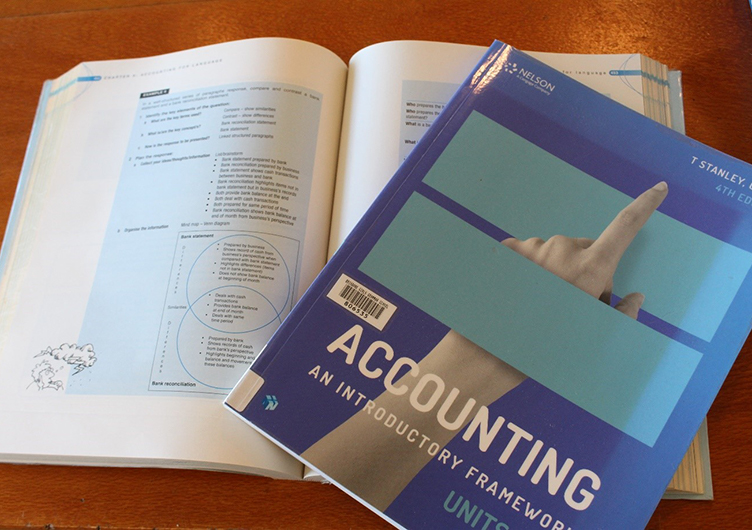
Accounting textbooks
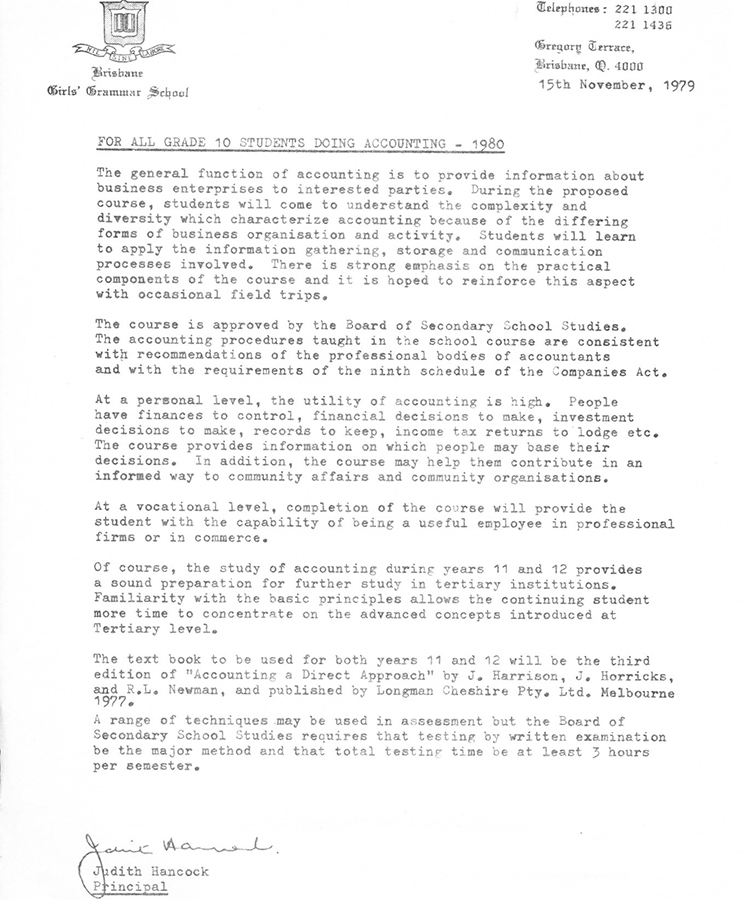
1979 Letter to Parents from Principal, Mrs Judith Hancock
The conundrum for the subject of Accounting, has always been its misassociation with the profession of accounting; its link with procedural ‘bookkeeping’, and its dissociation with financial literacy in the school context. This gives the perception to some, that this elective subject sits in a lower stratification of the knowledge in secondary school curriculum deemed to be ‘academic’. There is also an historic gender bias with deep socio-cultural tendrils at play in the perception of Accounting as a lower status subject in secondary schools. My doctoral thesis traced the point in history (in 1972) that could be deemed ‘the decision’ that meant Accounting became part of the current suite of QCAA academic subjects. Caught up in the significant conceptual transition in Queensland secondary education from 1975-1985 from a norm-based to a criteria-based system of assessment, all syllabuses have had to adapt with the assessment of higher levels of cognition requiring students to show a theoretical understanding, to synthesise and problem solve using higher order thinking and to analyse and interpret. The current 2019 syllabus emphasises these skill sets further, recognising that while procedural accounting is not the realm of the accountant any longer; the problem solving, explaining of one’s understanding of a problem that has been analysed and evaluated, are essential accounting skills.
Accounting at Brisbane Girls Grammar School has continued to grow and develop as an academic subject of equal status to other elective subjects offered in Years 11 and 12. The introduction of Accounting into the Year 10 curriculum in 2019, 40 years after Mrs Hancock’s letter introducing it into the School, shows it continues to thrive.
Ms Phillipa Greig
Staff 2002 – 2021
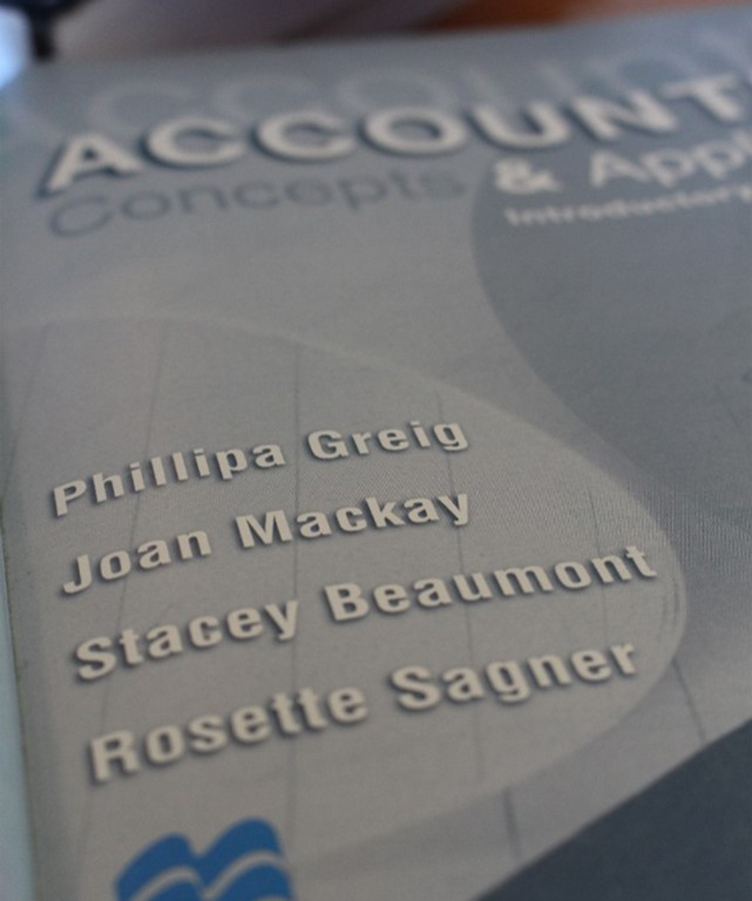
The author’s co-authored textbook
References
Australian Broadcasting Corporation. (2006). Lecture 2: From golden age to stagflation [Radio audio and transcript]. On Boyer Lectures. Retrieved from https://www.rba.gov.au/speeches/2013/sp-gov-211113.html#fn2
Board of Secondary School Studies, Queensland. (1978). Syllabus in Accounting Years 11-12. Brisbane: BSSS.
Board of Senior Secondary School Studies Queensland. (1992). Senior Accounting. Brisbane: BSSSS.
Brisbane Girls Grammar School. (1978). Minutes of Meeting of the Board of Trustees 27 June 1978. Brisbane: (unpublished).
Brisbane Girls Grammar School. (1979a). Minutes of Meeting of the Board of Trustees 24 July 1979. Brisbane: (unpublished).
Brisbane Girls Grammar School. (1979b). Minutes of Meeting of the Board of Trustees 16 October 1979. Brisbane: (unpublished).
Brisbane Girls Grammar School. (1979c). Letter from Mrs Judith Hancock dated 15 November, 1979. Brisbane: (unpublished).
Greig, P. (2018). Accounting: a case study of an elective subject in the Queensland senior high school curriculum [Doctoral thesis, Queensland University of Technology]. QUT eprints. https://eprints.qut.edu.au/116901/
Queensland Curriculum and Assessment Authority. (2018). Accounting General Senior Syllabus 2019 v2.0. Retrieved from https://www.qcaa.qld.edu.au/senior/senior-subjects/humanities-social-sciences/accounting/syllabus
Reserve Bank of Australia. (2021). Recession. [Education resource]. Retrieved from: https://www.rba.gov.au/education/resources/explainers/pdf/recession.pdf



